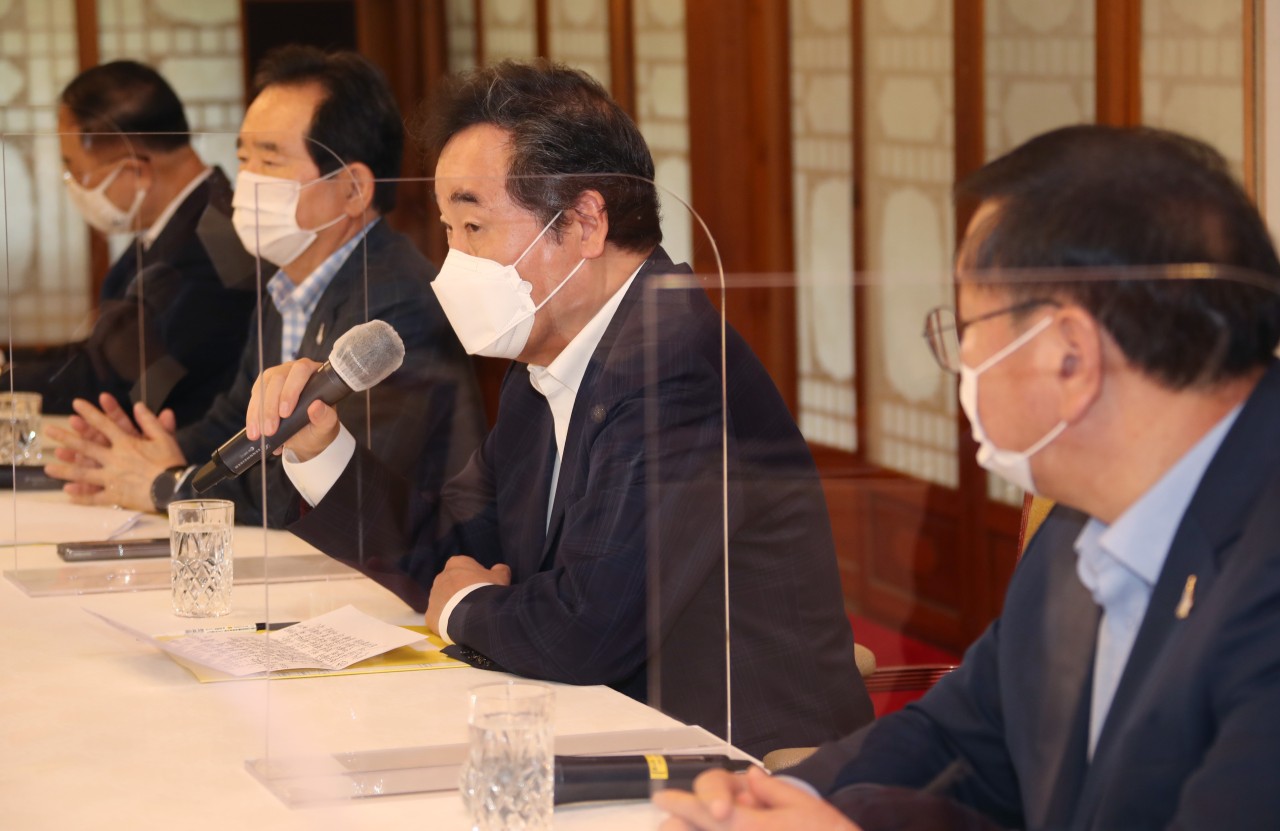The government, ruling party and presidential office vowed Sunday to draft an additional budget worth more than 7 trillion won ($5.88 billion), mostly to fund another set of disaster relief subsidies to deal with the economic fallout from COVID-19.
The decision, which rekindled concerns about the country’s fiscal soundness, came as the densely populated greater Seoul area faced an extended week of social distancing to contain the second wave of the pandemic.
Representatives of the government, the ruling Democratic Party of Korea and presidential office Cheong Wa Dae gathered at the Prime Minister’s Office on Sunday to discuss the details of the fourth extra budget bill.
Key attendants were Prime Minister Chung Sye-kyun, Deputy Prime Minister Hong Nam-ki, Democratic Party Chairman Lee Nak-yon and Floor Leader Kim Tae-nyeon, presidential chief of staff for policy Kim Sang-jo.
“The upcoming extra budget is to be funded entirely by deficit-covering bonds so the pressure has grown that the money should be spent wisely and effectively” said party chief Lee. “For that reason, authorities have chosen to prioritize the vulnerable.”
He added that the government should exert efforts to explain the inevitability of the decision, in order to reassure the public that nobody will face unfair discrimination in the payments.
Such “tailored” payment of disaster relief handouts has been the subject of dispute, and has especially triggered backlash from the minority progressive political camp. In May the government distributed some 13.6 trillion won in relief funds to all households to boost consumption.
But the latest survey conducted by Gallup Korea showed that 44 percent of the respondents preferred a selective payout system based on individual income levels, while 33 percent favored equal payouts to all households regardless of income level. A further 21 percent disapproved of the government providing additional disaster relief funds at all. The corresponding survey was carried out in late August on 1,200 adults across the nation.
Gyeonggi Gov. Lee Jae-myung, who had been against the tailored payment, took a step back on Sunday and reluctantly went along with the stance of the government and the ruling party.
“As member of the government and of the (ruling) party, I shall abide by the final decision (on the handouts),” Lee wrote on Facebook.
“Politicians, however, should bear in mind that people are more angered by unfairness than by poverty itself.”
He urged the government to set up a detailed and precise set of rules to sort out the beneficiaries in order to minimize the complaints and conflicts that may arise.
Officials also formed consensus on drafting a supplementary budget bill worth more than 7 trillion won, marking the fourth one so far this year.
“It will the first time in 59 years that (the government) drafts four extra budgets within a single year, which indicates the urgency of the current situation,” Lee said, adding that the newly added budget should take effect in time for the Chuseok holiday.
The government’s plan is to propose the extra budget bill at the Cabinet meeting on Sept. 15 and then take it to the National Assembly for final approval.
Seoul’s government has executed 59 trillion won so far this year to back up the coronavirus-hit economy -- 11.7 trillion in March mostly to help the Daegu-North Gyeongsang area, 12.2 trillion in April to fund the disaster relief fund program and a record 35.1 trillion in July.
The Ministry of Economy and Finance, which had repeatedly dismissed the need for additional fiscal spending, recently adjusted its stance.
“Under the current wartime circumstances, we should endure some temporary debts and deficits and finance should act as the last bastion for the nation’s economy,” Minister Hong said last week upon unveiling a record-high state budget worth 555.8 trillion won for 2021.
The key hurdle is the obvious impact on the nation’s fiscal soundness. The latest budget plan is to raise the country’s sovereign debt ratio to its gross domestic product to 43.8 percent, with total debt nearing 850 trillion won.
The increased fiscal debt will also require adjustments to the 2021 state budget bill, which is currently pending in the parliament and due for approval by year-end.
By Bae Hyun-jung (
tellme@heraldcorp.com)





![[Exclusive] Hyundai Mobis eyes closer ties with BYD](http://res.heraldm.com/phpwas/restmb_idxmake.php?idx=644&simg=/content/image/2024/11/25/20241125050044_0.jpg)
![[Herald Review] 'Gangnam B-Side' combines social realism with masterful suspense, performance](http://res.heraldm.com/phpwas/restmb_idxmake.php?idx=644&simg=/content/image/2024/11/25/20241125050072_0.jpg)

